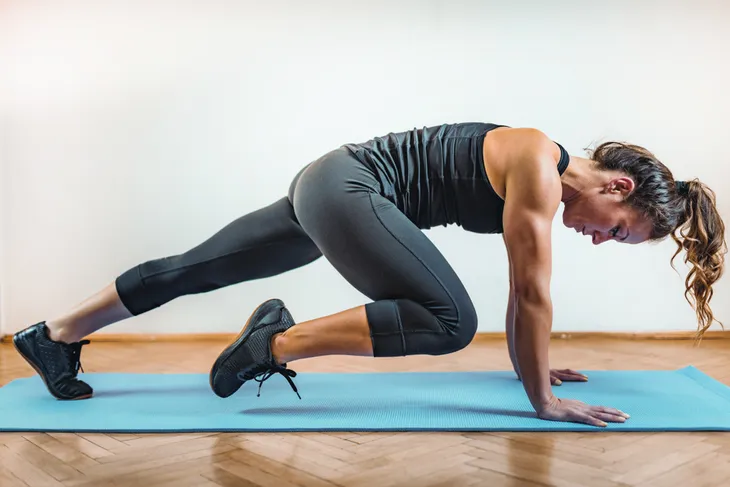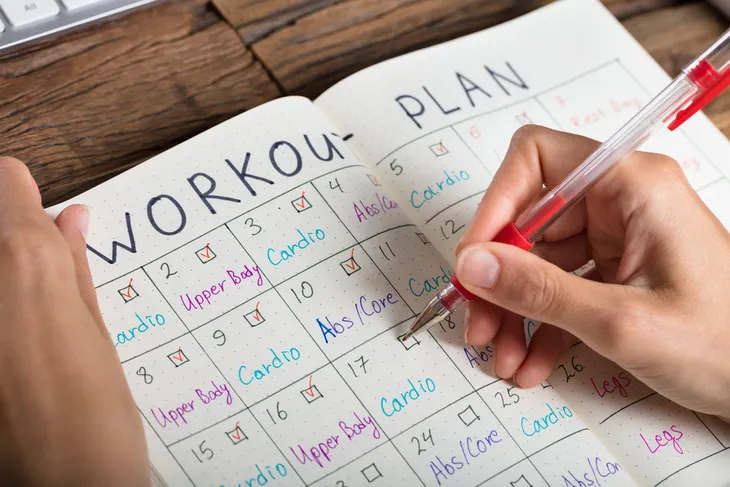As a physiotherapist and personal trainer, clients often ask me, “How often should I work out to achieve my fitness goals?” I believe this is an important question to ask as sorting out how often you should work out will set you on your path to success in reaching your fitness goals.
The answer to this question is dependent on a few questions that you must first ask yourself in order to be sure you’re starting on the right foot and not biting off more than you can chew. Remember, achieving fitness goals often takes time and dedication. Therefore, arming yourself with as much knowledge and devising a solid game plan is essential. Here are three questions to ask yourself to determine how often you should work out and why.
What Are Your Fitness Goals?
When someone is just starting on their fitness journey they are often very excited to get started and are prepared to dive right into a new fitness routine. But one of the first questions you should ask before determining how often you should work out is “what are your fitness goals?”
Using the most popular fitness goals as an example, most people are aiming to lose weight and body fat, tone their physique, or build muscle. With that in mind, each of these goals requires a different workout frequency each week. Let’s take a closer look at these next.
Losing Weight
First, if your main fitness goal is to lose weight and body fat, then you might want to consider exercising five to six times per week. This will allow you to maximize the number of calories you burn, in turn helping you to lose weight and body fat.
But don’t forget, your diet plays a large role in losing weight too. After all, you can’t out-exercise a poor diet.
Toning Your Physique
Further, if toning your physique is your ultimate goal, you may be able to achieve this by working out three to five times per week.
Focus on either total body workouts or choosing one body part per day to help you tone and sculpt your body. Don’t forget to reserve a few rest days in the week to help your body recover.
Building Muscle
Lastly, if you would like to build muscle it’s best if you work out five to six days per week leaving the remaining day as a rest day.
This frequency of workouts will allow you to dedicate enough time to each of the muscle groups you’re trying to grow and develop.
How Intense Are Your Workouts?
The next question I ask my clients is, “What is the intensity of your workouts?” When you’re in the gym working out, a lot of your progress in chasing down your fitness goals relies on the intensity of your workouts.
For example, if you’re completing heart-pumping, high-intensity interval training (HIIT) workouts then it’s best if you incorporate more recovery days. Since you’re working out quite hard and pushing your body to its limit, you might consider only working out a few times per week to avoid over-training.
On the other hand, if you’re completing slower-paced and less intense workouts that aren’t leaving you too exhausted, your body can probably tolerate training more frequently during the week.
How to Choose Your Workout Intensity
The best piece of advice I can give for this particular question is to test it out for yourself. Try a week of high-intensity workouts and see how your body reacts towards the end of the training week.
If you’re feeling run down and tired, chances are you’ve probably overdone it. However, if you’re feeling energetic and fresh, you’re safe to add another training day.
How Much Time Do You Have to Commit?
Most people lead very busy lives, trying to achieve that ideal work-life balance. At times, this doesn’t leave you with too much time to spare to dedicate to your fitness goals.
That’s why sitting down and planning your workouts is essential for success. If you have kids and a busy work schedule, it might be best to work out early in the morning before your family wakes up or possibly late in the evening after everyone is asleep. Calculate how many free mornings or evenings you have to spare and this will quickly answer the question of how often you should workout.
How to Make Your Workouts Count
Although you might be limited with your free time, you can certainly make the most of these workout sessions to stay on track to accomplish your goals.
If you only have three mornings free a week to dedicate to your fitness goals, then make these full-body workouts and increase the intensity. This will help you maximize your results for the short amount of time you have to spend exercising.
 running at night
running at nightHow Often Should You Work Out and Why?
Once you’ve asked yourself these three questions, sit down and plan out your workout sessions for the week or go and seek the help of a personal trainer. Schedule your workouts into your diary or calendar so that you can prioritize them.
Remember, accomplishing your fitness goals will take time and dedication so don’t bite off more than you can chew. Instead, make good use of the time you have available in the gym and get to work. Good luck!











